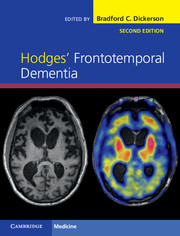Book contents
- Hodges' Frontotemporal DementiaSecond Edition
- Hodges' Frontotemporal Dementia
- Copyright page
- Dedication
- Contents
- Contributors
- Editor biographies
- Foreword
- Preface
- Section 1 Introduction to and brief history of FTD
- Section 2 Clinical phenotypes
- Section 3 Approach to the diagnosis of FTD
- Chapter 8 Overviewof clinical assessment of frontotemporal dementia syndromes
- Chapter 9 Neuropsychologicalassessment of frontotemporal dementia
- Chapter 10 Imagingof frontotemporal dementia
- Chapter 11 Cerebrospinalfluid biomarkers of frontotemporal lobar degeneration
- Chapter 12 Geneticcounseling for FTD
- Section 4 Pathology and pathophysiology
- Section 5 Treatment
- Index
- References
Chapter 12 - Geneticcounseling for FTD
from Section 3 - Approach to the diagnosis of FTD
Published online by Cambridge University Press: 05 May 2016
- Hodges' Frontotemporal DementiaSecond Edition
- Hodges' Frontotemporal Dementia
- Copyright page
- Dedication
- Contents
- Contributors
- Editor biographies
- Foreword
- Preface
- Section 1 Introduction to and brief history of FTD
- Section 2 Clinical phenotypes
- Section 3 Approach to the diagnosis of FTD
- Chapter 8 Overviewof clinical assessment of frontotemporal dementia syndromes
- Chapter 9 Neuropsychologicalassessment of frontotemporal dementia
- Chapter 10 Imagingof frontotemporal dementia
- Chapter 11 Cerebrospinalfluid biomarkers of frontotemporal lobar degeneration
- Chapter 12 Geneticcounseling for FTD
- Section 4 Pathology and pathophysiology
- Section 5 Treatment
- Index
- References
- Type
- Chapter
- Information
- Hodges' Frontotemporal Dementia , pp. 153 - 164Publisher: Cambridge University PressPrint publication year: 2016
References
- 1
- Cited by



